Ticket definitions are what make any ticket valid. With KORONA, you have a wide variety of parameters from which you can pick and choose.
On this page:
Creating Ticket Definitions
Ticket Definitions are not tickets but rather conditions, rules, and logic created for the tickets to function and be valid within KORONA. Go to the Ticket Definitions screen by clicking Ticketing > Ticket Definitions. You will see an overview of the current definitions you have set up.
Click the +New button to be taken to the definition creation screen. Here, you can provide a wide variety of parameters for your definition. You can choose when it is valid from and to based on calendar days, or you can have the ticket’s validity expire after a certain amount of time has passed.

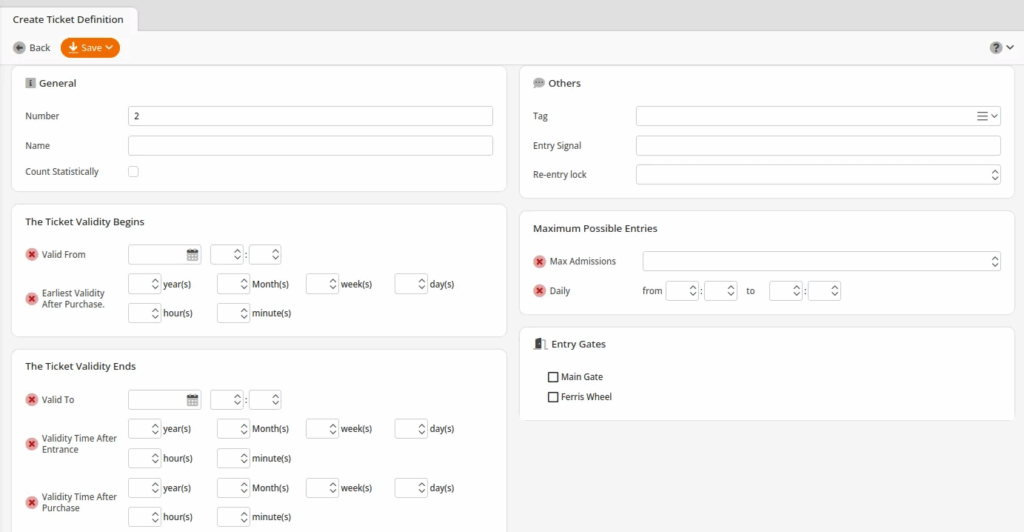
You can even set how much time needs to go by after purchase before the ticket becomes valid. This is great if you wish for certain types of ticket holders to have access to others. This can also be used if you would like VIP access before the general public.
You can also determine the maximum number of admissions a ticket type allows, or specific times of the day for admissions.
For the Entry Signal, you can use color names, HEX color codes (starting with #), and RGB values (RGB (0,0,0)).
Finally, you can assign that ticket definition to an Entry Gate. If you have multiple entry gates created, you may assign the ticket definition to those as well.
Saving Ticket Definition
Once you have created your ticket definition with the desired parameters, you will need to save it. Click the Save button at the top of the screen to save the definition. The ticket definition is now ready to be applied to any ticket. Please see our Ticket Type manual page for additional information.
Example Ticket Definitions
Here are some common examples of ticket definition types:
Day Pass
The day pass is one of the simplest ticket definitions that can be set up within KORONA. In this example, you will see that we have named our ticket definition “Day Pass.” We have set a day for the ticket to be valid after in ‘The Ticket Validity Begins‘ box.
Normally, you will have this set to one day before the day you have made that ticket. In ‘The Ticket Validity Ends‘ box, we have set the ‘Validity Time After Purchase‘ to one day.
We also set the ticket to only let the ticket holder in once. Once it’s been checked in at the entry gate, it may not be used again. Notice how this ticket is set to only be valid at the ‘Entry Gates.’ From this point forward, anyone who purchases a day pass from the terminal will have one day to use their ticket before it expires one day from its purchase time.
*Note: To set up any pass, you will need to navigate to Ticketing > Ticket Definitions and click the +New button.
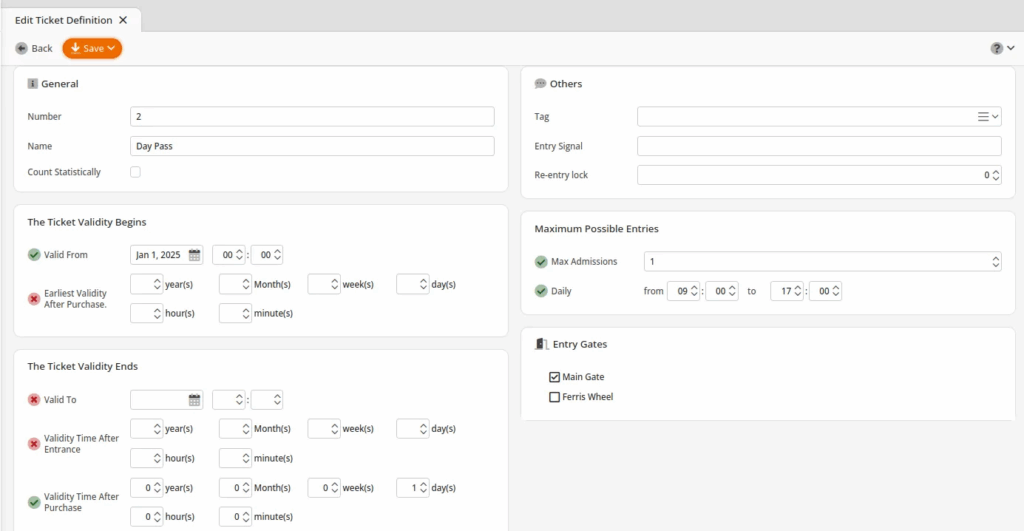
Season Pass
Season Passes are great when you want to allow guests in for the entire season.
Here, this pass is running for the summer season of 2021. ‘The Ticket Validity Begins‘ on the 21st of June, just after midnight. ‘The Ticket Validity Ends‘ just before midnight on September 22. In both boxes, we have left the earliest validity after purchase boxes blank.
We have also left both validity times after entrance and purchase boxes empty. That is because we want the customer to be able to get in and out of our museum anytime during the seasons. The ticket is assigned to the ‘Main’ Entry Gate.
Instead of limiting the number of admissions for this ticket, we have limited the hours of access. In this example, Season Pass ticket holders will only be able to get into our museum between 9:00 AM and 5:00 PM.
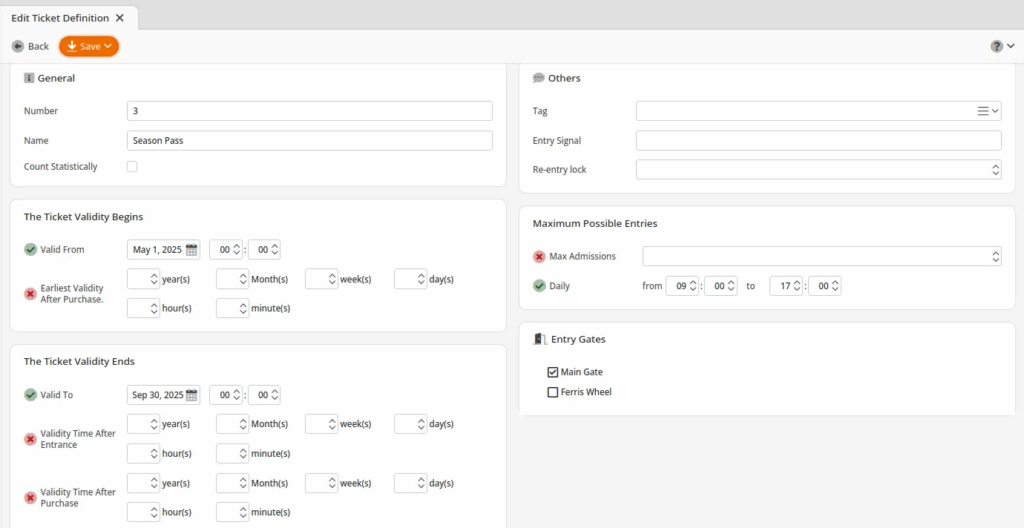
VIP Access Pass
VIP Access passes are great for providing special perks to higher-paying customers.
For this example, we have a 2-day pass with a few extra perks. ‘The Ticket Validity Begins‘ is set at the beginning of the week since it is a new definition. The ticket is active from the minute it is purchased.
We have ‘The Ticket Validity Ends‘ set for two days after purchase. Thus, the ticket holder will have two days to use it.
You will notice that the access pass is set to allow VIPs at any time. The difference here is that the access time is set for 8:00 AM to 5:00 PM. This allows VIPs to enter the museum one hour early and check out any exhibits one hour before the museum opens to the general public.
This definition also assigns a separate entry gate, the VIP Gate, so that VIP guests don’t have to wait in line to get into our museum.
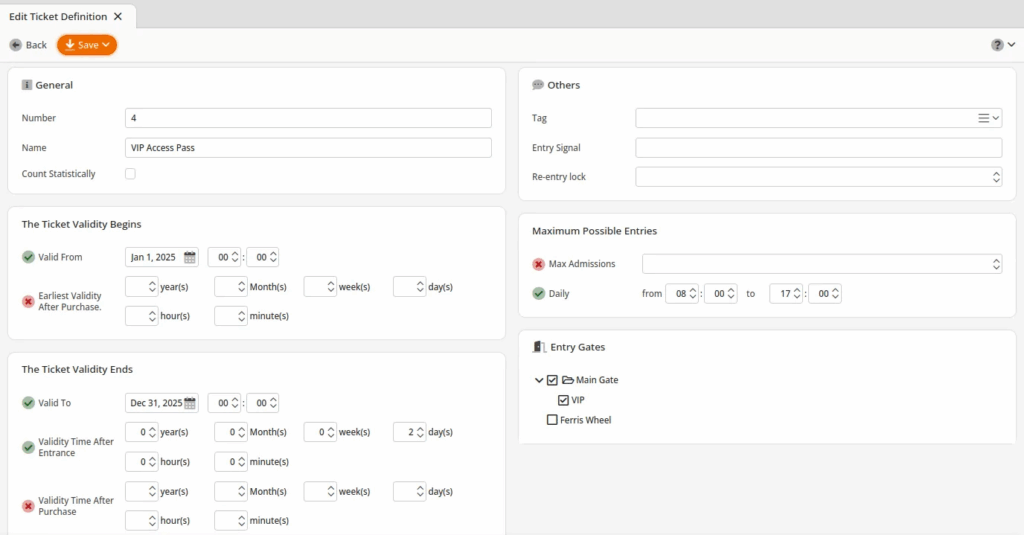
Multiple Entry Pass
Multiple Entry tickets are excellent for allowing people in more than once.
For this example, we have a one-week pass. ‘The Ticket Validity Begins‘ is set for the beginning of the week since it is a new definition. The ticket is active the minute it is purchased.
We have ‘The Ticket Validity Ends‘ set for one week after purchase. Thus, the ticket holder will have one week to use it.
However, here, we are going to allow that person to use their ticket three total times. So, we set the maximum number of admissions field to three.
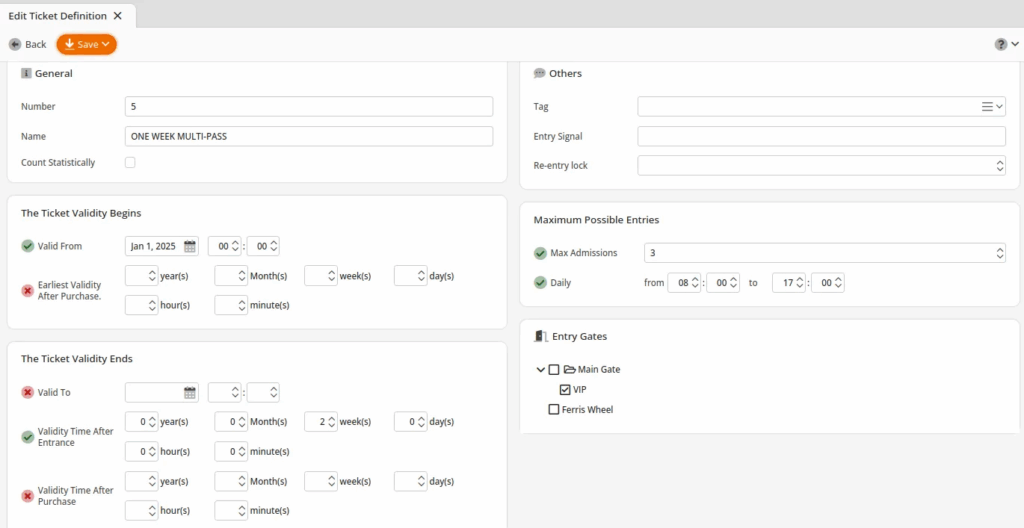
Multiple Entry Pass for Different Entry Gates
Similar to the above situation, if you have multiple Entry Gates because you have more than one event at your location, you can specify a ticket for usage at multiple entry gates.
In this example, we have our whole area called the “Entire Center,” and within our entire center, we have two Event Gates. One is called the ‘Main Gate,’ and one is called the ‘Lake House.’ With this setup, our guests would be allowed two entries at either gate or one entry at each Gate.
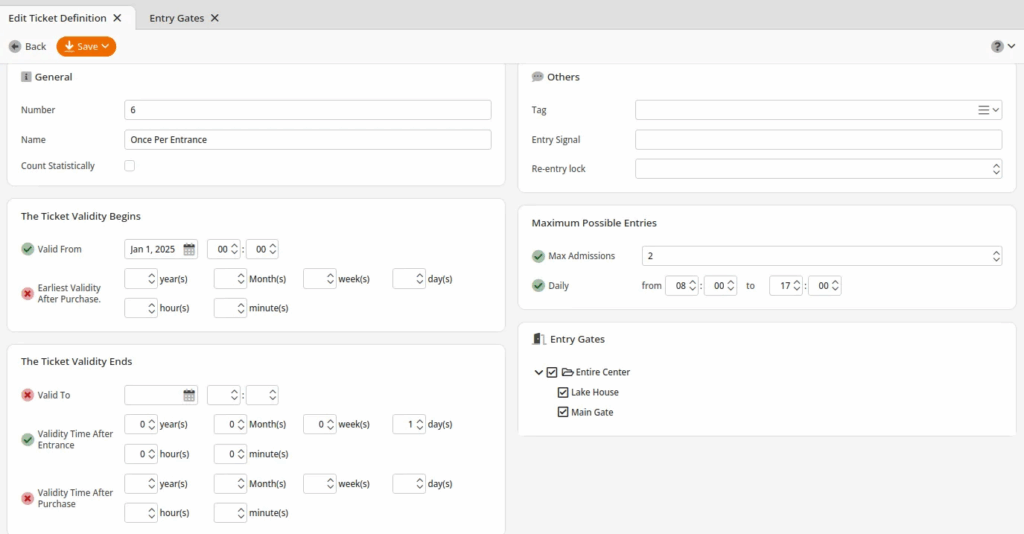
Family Pass
For this example, we have a one-day family pass. Since ‘The Ticket Validity Begins‘ is a new definition, it is set for the beginning of the week. The ticket is active the minute it is purchased.
We have ‘The Ticket Validity Ends‘ set for one day after purchase.
Since we are allowing a family into our museum, we need to set up the ticket for multiple admissions. In this case, we have five members. So, we set the maximum number of admissions field to five, one use per family member.



